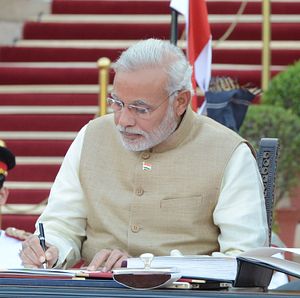As I’ve noted in my previous writing, India needs to take a hard look at its governance model and make major systematic changes, not mere tweaks in its legislation. This is because its network of laws is so convoluted that sweeping reform is the only option that makes sense. One recent issue that really demonstrates the problems facing some of India’s laws and governance is the recent Patel community agitation in Prime Minister Narendra Modi’s home state of Gujarat. Gujarat has, over the past couple of days, been suffering from caste-based unrest that has left up to ten people dead and many more injured. The government has dispatched paramilitary forces to stabilize the area.
Gujarat, long a mostly loyal bastion of Narendra Modi and his Bharatiya Janata Party (BJP), has been facing a series of strikes and protests by members of the Patidar (Patel) community, a caste of prosperous landowners, farmers, traders and merchants. The aim of the unrest is to secure reservations–a quota–of spots for members of the caste in business, government, and education. Currently, spots are reserved for many of India’s lower and disadvantaged castes, but the Patels do not fit in this category and are quite well off; in fact, Gujarat’s Chief Minister is one. About 14 percent of Gujarat’s population is Patel. The main Patel grievance is that because of reservations for certain castes, they are missing out on certain benefits.
The agitation’s structure and timing are strange. Its main leader is Hardik Patel, a 22-year-old who was previously a poor student and has, by all accounts, led an unremarkable life. There are allegations that his family has bad blood with a BJP official. Perhaps he just wanted a successful career despite his lack of accomplishment. In any case, the ferocity and organization of his agitation suggest possible support by rival parties of the BJP, especially the Congress Party and the Aam Aadmi Party (AAP). Some of the tactics used by the Patidar agitation are part of a disturbing pattern of Indian protestors using blackmail in an attempt to achieve their goals. These tactics include blocking roads and withholding the sale and distribution of basic goods.
Behind this issue is the deeper problem of India’s reservation system. While, ideally, there ought to be no reservations and a system based on pure merit, one could possibly argue for some allowances based on India’s social and economic structure. But for the most part, the system of reservations in India has led to high inefficiency and a system of entrenched privileges and entitlements for some lower caste groups and their leaders, who often distribute jobs as patronage–nobody in this situation has an incentive to actually do his or her job well.
Reservations prevent India from fully utilizing its talent in the most effective way, but more tragically, this system of affirmative action perpetuates the conditions it seeks to abolish by incentivizing the continuation of castes. It allows official neglect of actually truly improving the conditions of the worst-off in the country to persist. This is because doing so is not necessary if reservations can be substituted for development instead. A few select members of underprivileged groups are thus welcomed into the elite rather than there being a program to spread growth to everyone and negate the need for reservations altogether. As more and more Indian caste and religious groups, including more well-off ones, demand reservations, India runs the risk of reservering the great majority of its spots in many sectors based on quotas, completely undermining the concept of merit and a flexible job market, necessary attributes for success in today’s global economy.
No major party wants to touch the reservation system because of the electoral consequences, but this is something that needs to be done at some point. Amid the chaos of the agitation, Hardik Patel made a remarkably perceptive comment: “Either free the country from reservation or make everybody the slave of reservation.” Unless India wants to become a reservation raj, it should just get rid of the system altogether and focus on expanding growth and creating equality of opportunity and developmental conditions, which of course would probably initially hurt the elite more than the castes with reservations.

































